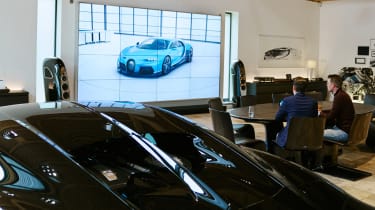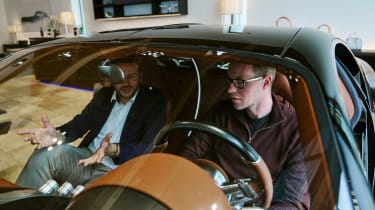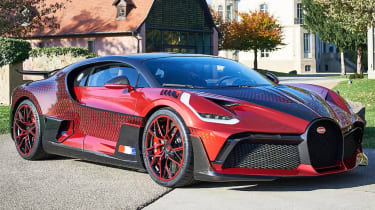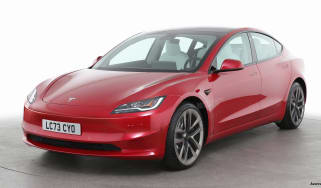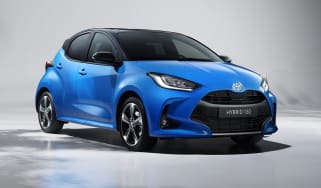Bugatti configurator guide: how to spec your Chiron
We discover what it’s like to choose the customer specification for a £3.2million Bugatti Chiron Super Sport
A day in the life of a multi-millionaire is something many of us would like to experience, I’m sure. We’ve all dreamed of that Euromillions lottery win and how we might spend it, and the purchase of an ultra-exclusive hypercar probably makes that shortlist for many people. Could I interest you in a Bugatti Chiron Super Sport, sir, madam?
Well, even if I could grab your attention, you wouldn’t be able to buy one, because they’re all sold. But despite a global pandemic, the French brand’s business is booming. It’s a rarefied world that Bugatti owners live in, and Auto Express got to experience what it’s like for a day when it comes to specifying one of these £3.2million monsters.
“The average Bugatti customer owns more than 50 cars,” the company’s test driver Andy Wallace tells us, and we suspect they’re not Vauxhall Corsas or Volkswagen Polos. But the well heeled clients that descend on Bugatti’s Molsheim factory, on the site of Chateau Saint Jacques – the large country house company founder Ettore Bugatti used to entertain clients just inside the French border, 15 miles west of Strasbourg – come to indulge their passion for a kind of vehicle they can’t get elsewhere, something Bugatti prides itself on. That’s exactly what we’re here to do, dive inside the wonderful world of Bugatti, before we head out onto the road to sample exactly what this incredible machine can achieve.
Talking to Jascha Straub, the Molsheim Atelier’s design and sales representative, the price tag is often immaterial. The Super Sport starts from around £3.2million basic – a brilliantly incongruous term for such a machine – including UK taxes, and we’re told that most buyers spend between £300,000 and £400,000 on options alone, although Bugatti doesn’t outline individual option costs.
But there are some brilliantly individual requests that the factory has to contend with, according to Jascha, and it’s his job to advise customers on the right way to go. He’s “the personal link between the customer and the bespoke creative journey, intrinsically aware of every last detail offered by Bugatti and shaping the ultimate buying experience with the French luxury brand”.
So, snake skin? Alligator leather? “We’ve had all of these requests,” he tells me. “But we had to say no to this. Maybe a few years ago we would have done it, but for example, our collaborations with Hermes, they have their own leather, but the leather for their bags is not automotive grade, it’s not made to be under 100 degrees, so we have certain requirements for our materials, which makes it complicated.
“We want to achieve the highest quality – this is what Bugatti stands for,” Jascha explains. “Some things aren’t possible due to legislation and factors you might not immediately imagine, such as UV light damaging materials after a life spent in the sun.”
Jascha says that these outlandish requests “happen quite often actually because people ask for different things on the steering wheel or inner dashboard, but we’re not allowed to touch this because of the airbags and the homologation of the car. If you changed something here, you’d have to crash test the car again and this is super-expensive. No customer wants to pay this.
“Sometimes customers request things that are unusual, such as a really bright colour for the dash. They have to sign a safety waiver that says the reflection in the windscreen might make it not so easy to see out and that Bugatti isn’t responsible for an accident arising from this issue.”
“Every customer wants to go crazy. Recently, though, every car has been individualised, but in terms of materials the customers are more conventional now. Maybe they learned from the past that some things don’t make sense. And what we offer in terms of materials – Alcantara, carbon fibre, real aluminium – is something special.”
We keep things more reserved as we kick off our configuration journey, basing our Auto Express Chiron on a subtle French theme as we follow the same path Bugatti owners have.
A light blue hue for the all-carbon-fibre bodywork takes my fancy, with a darker two-tone colour for a little contrast on the lower sections of the body. I toyed with lighter, multi-spoke wheels in a bright-silver alloy finish; I thought they’d work, but immediately from Jascha’s reaction I can tell he’s not quite sure. Yet he treads the line between advice and respect deftly, pointing out why this particular wheel style in this particular finish might not work, careful not to rubbish my choice.
I switch back to the diamond-cut Super Sport alloys and plump for the French Tricolore on the underside of the car’s huge rear spoiler that doubles as an air brake. Plus I pick out the scalloped C-shape around the doors – a defining design detail – in bright aluminium and opt for a grille decal to emphasise the firm’s trademark horseshoe air intake.
Inside, I choose tan leather with matte carbon fibre for key parts of the cabin, including the central spine that houses the car’s exquisitely machined climate controls. Customers can opt for laser-etched door panels with an inlay of their choice; they can match the cabin stitching to their favourite hue – the colour of a treasured watch face, perhaps – or embroidery on the headrests with a bespoke insignia. The choices aren’t strictly limitless, but they might as well be given the level of customisation on offer. And Bugatti will look to introduce 3D-printed parts in the future, furthering the scope for personalisation.
“We once looked at doing a car for a potential customer with one arm that featured just one shift paddle – a rally-style rocker paddle to change gear,” Jascha tells me. “We’ve also done a car with the gear lever in wood. We are open to do whatever the customer wants, as long as it’s within homologation and quality boundaries.”
I take a less is more approach to our car’s cabin. I mulled over the idea of a laser-inscribed Auto Express logo on the Chiron’s door cards – many customers choose to go truly bespoke, with their initials emblazoned around various parts of the car. Resale value is obviously not a concern for those who take the plunge with a Chiron, but I chose to keep it simple.
In fact, our spec of car is relatively tame. If you have pockets deep enough, Bugatti can build a one-off commission, and its Divo ‘ladybug’ is a great example. You might think the black-and-red pattern on this bespoke car’s body would be most easily achieved with a wrap, but this is Bugatti and its patrons expect so much more. That’s what its business is built on. As a result, the Divo ‘ladybug’ – so called because of its colour scheme – was actually painted.
But even painting a regular pattern wouldn’t be right due to the car’s curves and the way it catches the light, so computer models were drawn up to perfectly simulate a ‘regular’ look to the diamond insignia, tricking the eye. It’s called a “geometric-dynamic algorithmic fading pattern”, which highlights that the rhomboids also fade in a gradient along the length of the car. There’s achieving a complicated request, and then there’s this: it took two years to complete.
“The car has so many different volumes so we had to correct it, sometimes take out one row of those diamonds and put it at a slightly different angle, so in the end the whole pattern is running nicely and working with the lines of the car,” Jascha adds. “The configuration process was quite easy, but the execution was crazy. Lots of work and lots of headaches. But I think this makes it even more special. We wanted to challenge ourselves and paint it, otherwise you could take a foil and wrap it. We wanted to achieve the best. It makes the craftsmanship feeling. This is the most complicated project over my years at Bugatti.”
But does Bugatti ever step in to protect its products and their public perception? Not really. Jascha tells us that they’ll give advice to prospective buyers on which options or inspirations might work well with other bits and pieces Bugatti can achieve, but I get the sense the brand would never veto a customer request on the grounds of taste.
“We also have to have our legacy in mind; it’s like a jewel and we don’t want to destroy it,” he says. “From an aesthetic point of view we would always try to steer the customer in a digestible point of view for us. We try not to exaggerate too much, but it is down to taste of course.”
In fact, Jascha tells me of a few cars (without revealing their owners) that are, ‘individual’. Boxer Floyd Mayweather famously owns a pearl matte white Veyron Grand Sport complete with white wheels, for example. Each to their own.
Now join us as we hit the road in the Bugatti Chiron Super Sport...

